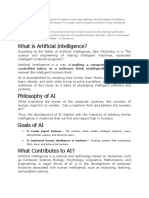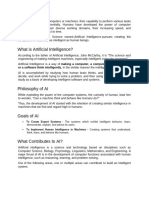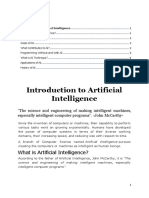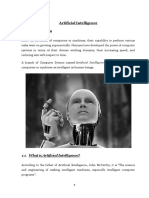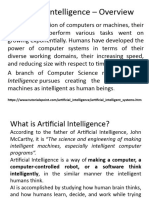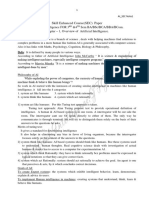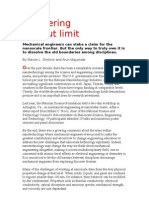Cloud Computing Slide
Uploaded by
Trishank ThakurCloud Computing Slide
Uploaded by
Trishank ThakurSince the invention of computers or machines, their capability to perform
various tasks went on growing exponentially. Humans have developed the
power of computer systems in terms of their diverse working domains, their
increasing speed, and reducing size with respect to time.
A branch of Computer Science named Artificial Intelligence pursues creating
the computers or machines as intelligent as human beings.
What is Artificial Intelligence?
According to the father of Artificial Intelligence, John McCarthy, it is “The
science and engineering of making intelligent machines, especially
intelligent computer programs”.
Artificial Intelligence is a way of making a computer, a computer-
controlled robot, or a software think intelligently, in the similar
manner the intelligent humans think.
AI is accomplished by studying how human brain thinks, and how humans
learn, decide, and work while trying to solve a problem, and then using the
outcomes of this study as a basis of developing intelligent software and
systems.
Philosophy of AI
While exploiting the power of the computer systems, the curiosity of
human, lead him to wonder, “Can a machine think and behave like humans
do?”
Thus, the development of AI started with the intention of creating similar
intelligence in machines that we find and regard high in humans.
Goals of AI
To Create Expert Systems − The systems which exhibit intelligent behavior,
learn, demonstrate, explain, and advice its users.
To Implement Human Intelligence in Machines − Creating systems that
understand, think, learn, and behave like humans.
What Contributes to AI?
Artificial intelligence is a science and technology based on disciplines such
as Computer Science, Biology, Psychology, Linguistics, Mathematics, and
Engineering. A major thrust of AI is in the development of computer
functions associated with human intelligence, such as reasoning, learning,
and problem solving.
Out of the following areas, one or multiple areas can contribute to build an
intelligent system.
Programming Without and With AI
The programming without and with AI is different in following ways −
Programming Without AI Programming With
AI
A computer program without AI can answer A computer program
the specific questions it is meant to solve. with AI can answer
the generic questions
it is meant to solve.
AI programs can
absorb new
modifications by
putting highly
independent pieces of
Modification in the program leads to change in its
information together.
structure.
Hence you can modify
even a minute piece
of information of
program without
affecting its structure.
Modification is not quick and easy. It may lead to affecting Quick and Easy
the program adversely. program modification.
What is AI Technique?
In the real world, the knowledge has some unwelcomed properties −
Its volume is huge, next to unimaginable.
It is not well-organized or well-formatted.
It keeps changing constantly.
AI Technique is a manner to organize and use the knowledge efficiently in
such a way that −
It should be perceivable by the people who provide it.
It should be easily modifiable to correct errors.
It should be useful in many situations though it is incomplete or inaccurate.
AI techniques elevate the speed of execution of the complex program it is
equipped with.
Applications of AI
AI has been dominant in various fields such as −
Gaming − AI plays crucial role in strategic games such as chess, poker, tic-tac-
toe, etc., where machine can think of large number of possible positions based
on heuristic knowledge.
Natural Language Processing − It is possible to interact with the computer
that understands natural language spoken by humans.
Expert Systems − There are some applications which integrate machine,
software, and special information to impart reasoning and advising. They
provide explanation and advice to the users.
Vision Systems − These systems understand, interpret, and comprehend
visual input on the computer. For example,
o A spying aeroplane takes photographs, which are used to figure out
spatial information or map of the areas.
o Doctors use clinical expert system to diagnose the patient.
o Police use computer software that can recognize the face of criminal with
the stored portrait made by forensic artist.
Speech Recognition − Some intelligent systems are capable of hearing and
comprehending the language in terms of sentences and their meanings while a
human talks to it. It can handle different accents, slang words, noise in the
background, change in human’s noise due to cold, etc.
Handwriting Recognition − The handwriting recognition software reads the
text written on paper by a pen or on screen by a stylus. It can recognize the
shapes of the letters and convert it into editable text.
Intelligent Robots − Robots are able to perform the tasks given by a human.
They have sensors to detect physical data from the real world such as light,
heat, temperature, movement, sound, bump, and pressure. They have efficient
processors, multiple sensors and huge memory, to exhibit intelligence. In
addition, they are capable of learning from their mistakes and they can adapt to
the new environment.
History of AI
Here is the history of AI during 20th century −
Year Milestone / Innovation
1923 Karel Čapek play named “Rossum's Universal Robots” (RUR) opens in
London, first use of the word "robot" in English.
1943 Foundations for neural networks laid.
1945 Isaac Asimov, a Columbia University alumni, coined the term Robotics.
Alan Turing introduced Turing Test for evaluation of intelligence and
1950 published Computing Machinery and Intelligence. Claude Shannon
published Detailed Analysis of Chess Playing as a search.
John McCarthy coined the term Artificial Intelligence. Demonstration of
1956
the first running AI program at Carnegie Mellon University.
1958 John McCarthy invents LISP programming language for AI.
Danny Bobrow's dissertation at MIT showed that computers can
1964 understand natural language well enough to solve algebra word problems
correctly.
Joseph Weizenbaum at MIT built ELIZA, an interactive problem that
1965
carries on a dialogue in English.
Scientists at Stanford Research Institute Developed Shakey, a robot,
1969
equipped with locomotion, perception, and problem solving.
The Assembly Robotics group at Edinburgh University built Freddy, the
1973 Famous Scottish Robot, capable of using vision to locate and assemble
models.
The first computer-controlled autonomous vehicle, Stanford Cart, was
1979
built.
1985 Harold Cohen created and demonstrated the drawing program, Aaron.
Major advances in all areas of AI −
Significant demonstrations in machine learning
Case-based reasoning
Multi-agent planning
1990
Scheduling
Data mining, Web Crawler
natural language understanding and translation
Vision, Virtual Reality
Games
The Deep Blue Chess Program beats the then world chess champion,
1997
Garry Kasparov.
Interactive robot pets become commercially available. MIT
displays Kismet, a robot with a face that expresses emotions. The
2000
robot Nomad explores remote regions of Antarctica and locates
meteorites.
You might also like
- Seminar Report On Artificial Intelligence (AI)60% (15)Seminar Report On Artificial Intelligence (AI)15 pages
- Audience Prerequisites: What Is Artificial Intelligence?No ratings yetAudience Prerequisites: What Is Artificial Intelligence?39 pages
- What Is Artificial Intelligence?: Making Intelligent Machines, Especially Intelligent Computer Programs"No ratings yetWhat Is Artificial Intelligence?: Making Intelligent Machines, Especially Intelligent Computer Programs"16 pages
- Lecture Notes Artificial Intelligence COMP 241: Niccolo Machiavelli, Italian (1469-1527)No ratings yetLecture Notes Artificial Intelligence COMP 241: Niccolo Machiavelli, Italian (1469-1527)15 pages
- Artificial Intelligence UNIT-1: Neha Assiatant Professor Dft-NiftNo ratings yetArtificial Intelligence UNIT-1: Neha Assiatant Professor Dft-Nift62 pages
- What Is Artificial Intelligence TutorialNo ratings yetWhat Is Artificial Intelligence Tutorial31 pages
- Project Report ON "Artificial Intelligence"100% (1)Project Report ON "Artificial Intelligence"24 pages
- Unit - 1 Artificial Intelligence: History of AINo ratings yetUnit - 1 Artificial Intelligence: History of AI19 pages
- Bachelor of Engineering IN Computer Science and Engineering: Internship ReportNo ratings yetBachelor of Engineering IN Computer Science and Engineering: Internship Report24 pages
- WINSEM2024-25_BMEE407L_TH_VL2024250503560_2024-12-14_Reference-Material-INo ratings yetWINSEM2024-25_BMEE407L_TH_VL2024250503560_2024-12-14_Reference-Material-I99 pages
- Writing Review of Related Literature and Studies: Prepared by Chona V. Cayabat, DbaNo ratings yetWriting Review of Related Literature and Studies: Prepared by Chona V. Cayabat, Dba19 pages
- Islamic University of Technology (IUT) : Department of Electrical and Electronic Engineering (EEE) Class RoutineNo ratings yetIslamic University of Technology (IUT) : Department of Electrical and Electronic Engineering (EEE) Class Routine1 page
- Basic Concept of Industrial EngineeringNo ratings yetBasic Concept of Industrial Engineering17 pages
- Mohammad Abdullahi Azare (Power Point Presentation)50% (2)Mohammad Abdullahi Azare (Power Point Presentation)17 pages
- Sixth Sense Technology: A Technical Seminar Report Submitted ToNo ratings yetSixth Sense Technology: A Technical Seminar Report Submitted To9 pages
- Written/Composed By: - SHAHZAD IFTIKHAR Contact # 0313-5665666 WebsiteNo ratings yetWritten/Composed By: - SHAHZAD IFTIKHAR Contact # 0313-5665666 Website24 pages
- Faculty Yearbook Ebit Full 2019.zp180059No ratings yetFaculty Yearbook Ebit Full 2019.zp180059934 pages
- 5G Mobile Technology: BY M.Hemalatha HT - NO: 106T1A0453No ratings yet5G Mobile Technology: BY M.Hemalatha HT - NO: 106T1A045326 pages
- CE51: Engineering Hydrology: University of Science and Technology of Southern PhilippinesNo ratings yetCE51: Engineering Hydrology: University of Science and Technology of Southern Philippines3 pages
- Siddaganga Institute of Technology, Tumakuru - 572 103No ratings yetSiddaganga Institute of Technology, Tumakuru - 572 1033 pages
- MTD 2023 / MTD 3043: Systems Analysis and DesignNo ratings yetMTD 2023 / MTD 3043: Systems Analysis and Design45 pages


